
In China, the client relationship doesn’t begin with an email campaign or a phone call — it begins with a WeChat message. Over the past decade, WeChat has redefined how luxury brands engage with their audiences, shifting from transactional touchpoints to always-on, relationship-driven interactions. Today, WeChat is not only a social and commerce hub but also a testing ground for AI-powered marketing and e-commerce solutions that deliver hyper-personalized and ultimate luxury experiences at scale.
By contrast, western platforms like WhatsApp are only beginning to evolve into clienteling tools. While promising, their capabilities remain limited and far behind the rich, integrated ecosystem that WeChat offers. As a result, many western brands continue to treat messaging platforms primarily as a customer support channel—overlooking its true potential as a driver of loyalty, community, and long-term growth.
This reimagined model of client engagement on WeChat offers powerful lessons for global luxury players. By exploring the following five lessons—illustrated with real brand examples—luxury houses can gain fresh inspirations on how to build loyalty, elevate services, and scale personalization in today’s digital and AI age.
WeChat is a “super app” that connects nearly every aspect of Chinese consumers’ daily lives. From messaging friends and family to making payments, ordering taxis, or booking tickets, it has become the default channel for both social and service interactions. Within this ecosystem, brands can activate multiple touchpoints to engage clients across different scenarios. Unsurprisingly, nearly all luxury houses have built strong WeChat presences to stay continuously connected with their audiences.
Take Chanel as an example: the brand leverages Moments Ads to reach new potential clients, while its Official Account and WeChat Channel are used to deliver brand news, videos, and livestreams directly to followers and potential clients. In addition,Chanel operates multiple Mini Programs designed to capture and serve different client interests—from online shopping to brand storytelling—ensuring targeted journeys that mirror client needs.

WeCom, the enterprise version of WeChat, enables luxury brands to deliver high-touch, personalized clienteling that brings the boutique experience into the digital realm.
For beauty houses, group-based interactions are especially effective because product discovery is social by nature—clients look for inspiration, tutorials, and peer validation. By curating exclusive WeChat chat groups, beauty advisors (via WeCom) can manage multiple chat groups in scale, share skincare and makeup tips, product recommendations, and promotions, cultivating a sense of community that drives both engagement and repeat purchases.
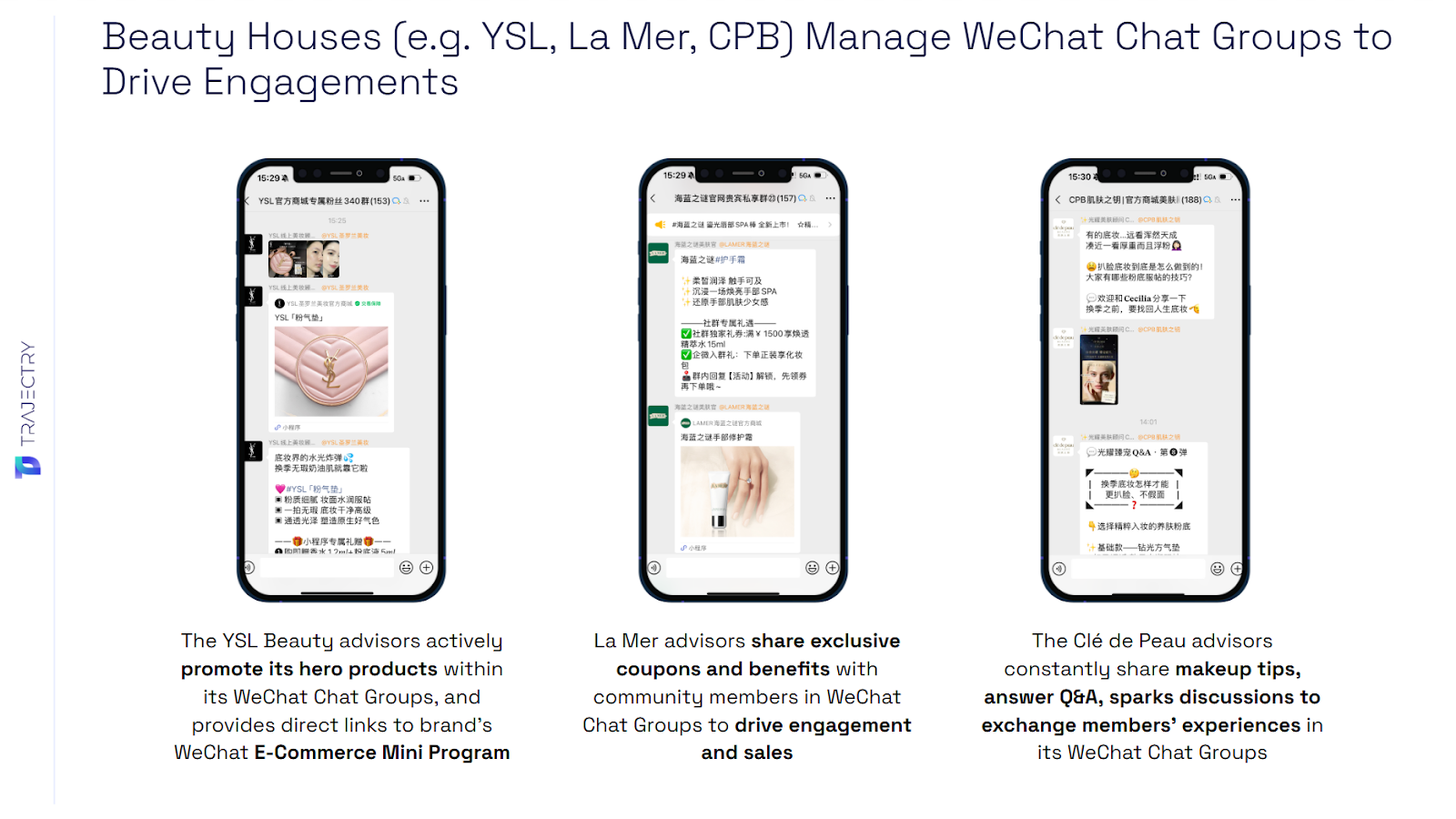
In contrast, fashion and jewelry brands place higher value on exclusivity and intimacy. Here, WeCom becomes a channel for 1-on-1 relationships where client advisors go far beyond sales transactions. Personalized touches—such as birthday or festival greetings, digital clienteling services, or invitations to private events—strengthen emotional bonds and reinforce the aura of rarity and privilege that defines luxury.
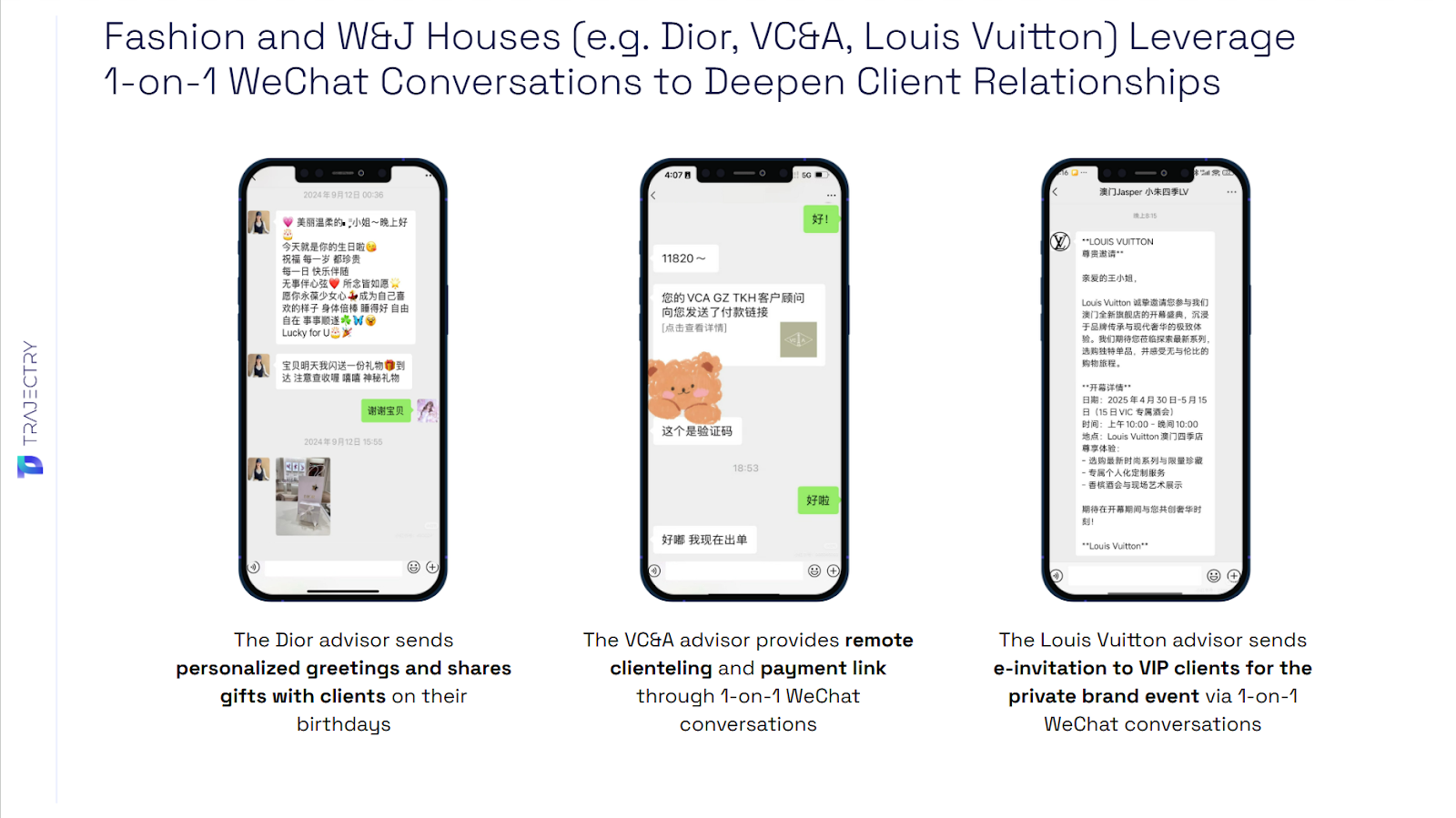
Historically, the main pain points of online shopping have been the lack of personalized guidance and the difficulty of choosing the right size or color without a try-on experience. To recreate the intimacy and service quality of offline luxury shopping in digital spaces, many brands are partnering with third-party solution providers and leveraging AI tools to enrich their WeChat ecosystems and deliver seamless and immersive journeys.
In beauty, virtual try-on has become standard, allowing clients to experiment with different shades and colors before committing to a purchase. Likewise, footwear, watch, and jewelry maisons are integrating 3D demonstrations and virtual try-on, enabling clients to preview how products will look in real life—effectively bringing the boutique trial experience online. (Kivisense, a leading AI retail technology startup and Trajectry’s innovation partner, can deliver 3D configuration and virtual try-on services for brands.)
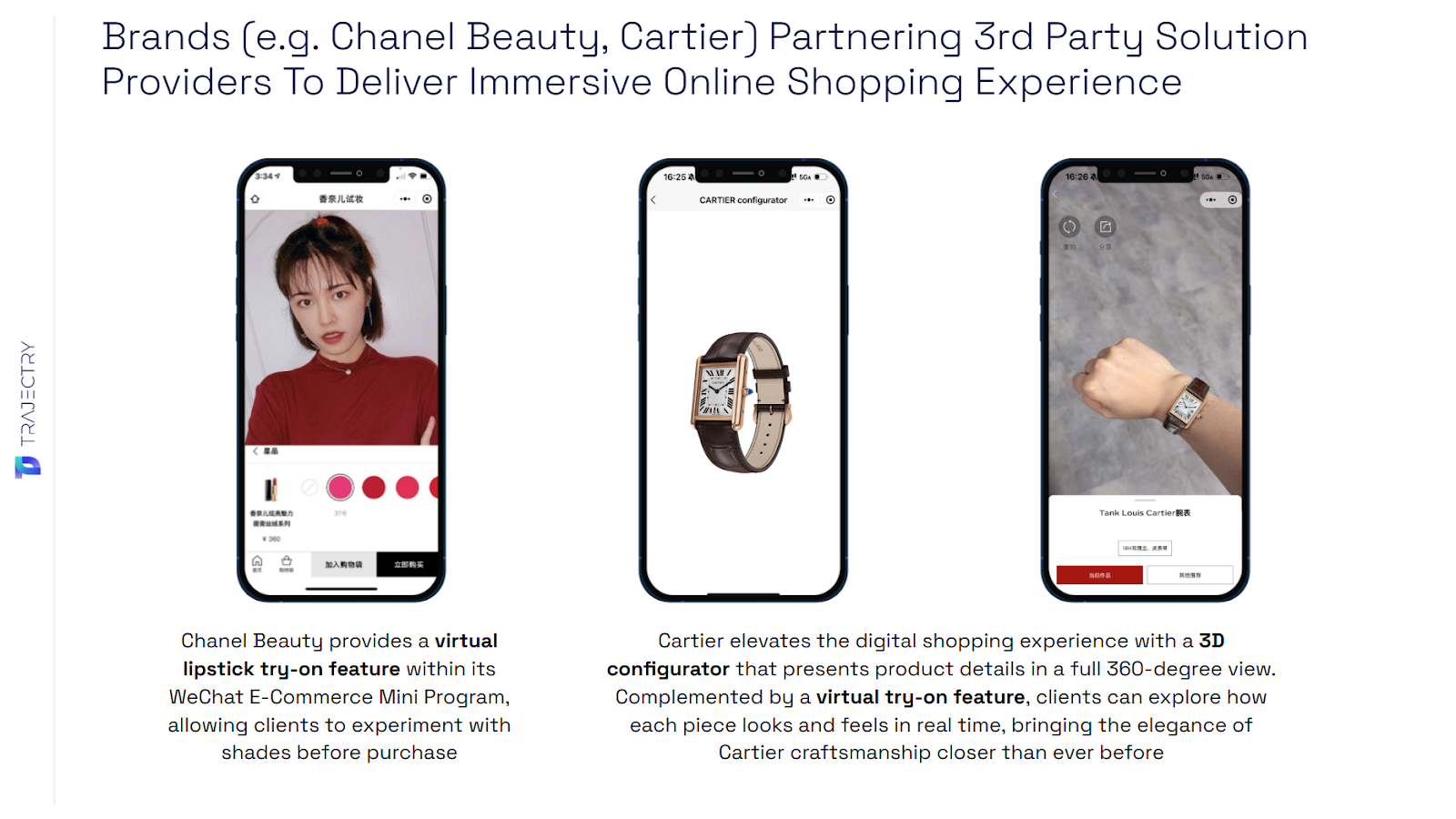
Leading luxury brands, e.g. Tiffany & Co., introduced live 1-on-1 video consultations on WeChat, allowing clients to book a time slot to explore products of interest and make purchases directly within the live consultation. (Chatail, a live streaming solution provider and Trajectry’s innovation partner, can deliver live video consultation and livestreaming services.)

Today, Chinese consumers expect seamless omnichannel engagement, moving effortlessly between digital and physical touchpoints via their smartphones. To deliver a consistent brand experience, luxury houses are restructuring online service offerings and data flows.
For example, to drive traffic from online to offline, many maisons have launched WeChat Mini Programs with store locators, visit reservations, and pre-consultation features. This not only reduces client uncertainty but also allows in-store advisors to prepare in advance, ensuring more tailored experiences. (Trajectry was partnered with Zegna to design the UIUX of its current ongoing Global Store Locator Mini Program to catering the needs of traveling Chinese consumers)
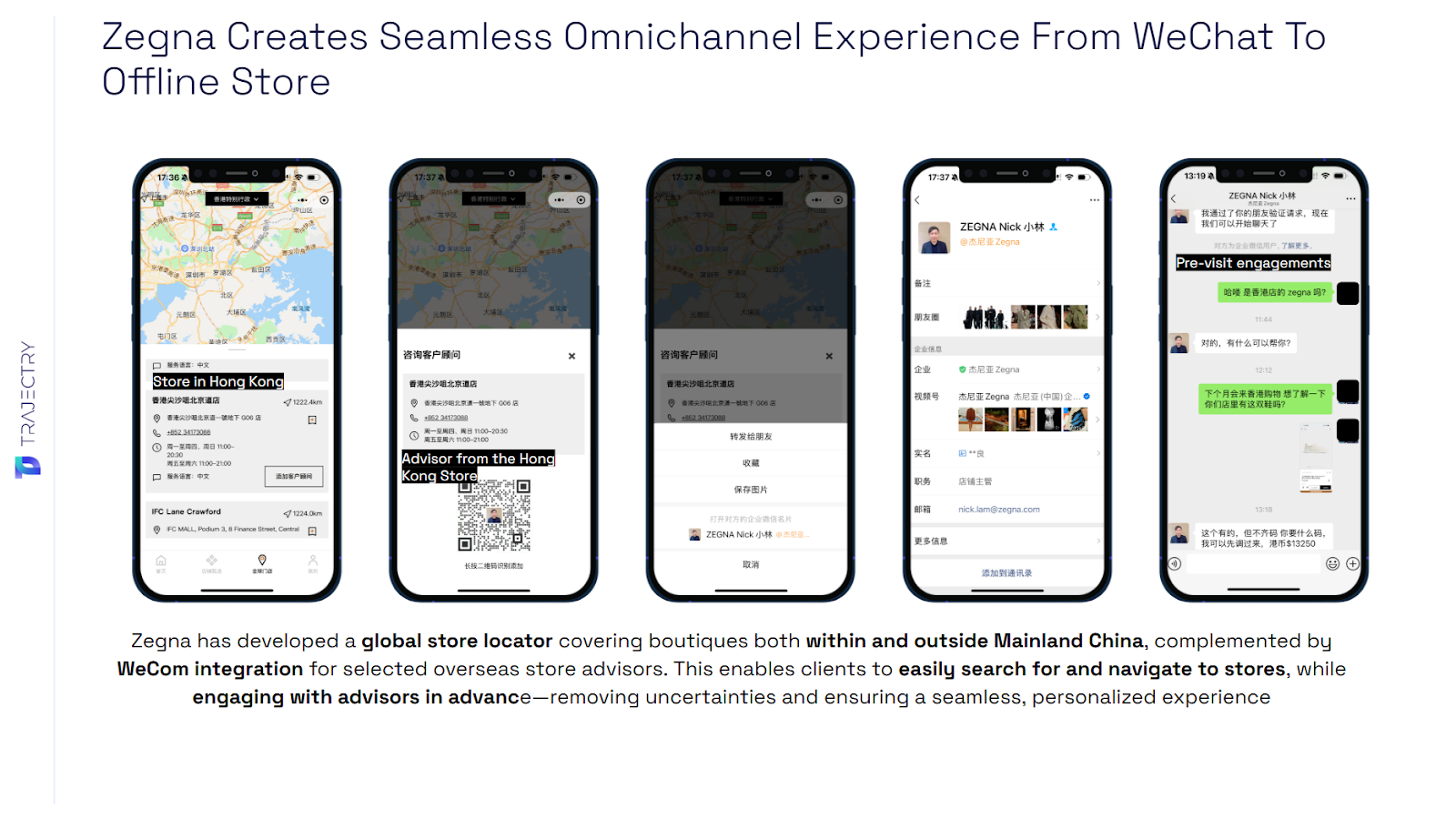
Another critical loyalty touchpoint—after-sales service—is also being reimagined online to remove friction. Instead of bringing items into stores and enduring lengthy inspections, clients can now arrange service requests directly through WeChat. Brands like Bulgari offer seamless and personalized E-repair assistance on WeChat, streamlining the process while preserving luxury-level service. (Trajectry was partnered with Bulgari to develop this E-repair WeChat Mini Program as a central gateway, redirecting users to dedicated platforms or solutions based on their specific service requirements)
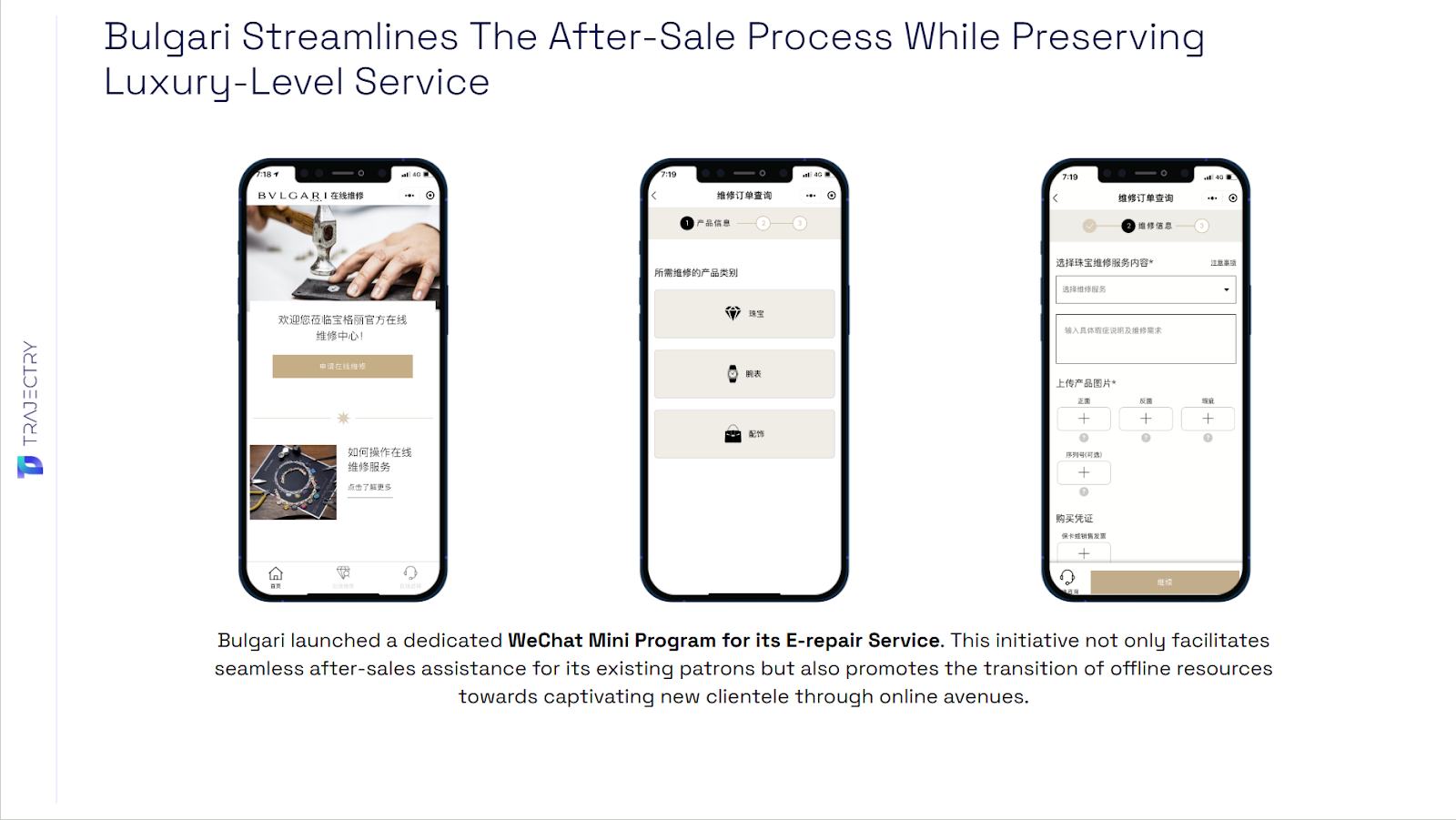
Clients today expect brand communications to reflect their individual preferences, behaviors, and timing—not just their names. As a result, static or rule-based CRM messages are no longer sufficient. By leveraging WeCom, client advisors can access past unstructured conversations data to enrich client tagging, deliver more personalized services, and seamlessly share the latest branded content with targeted clients. When WeChat Mini Programs are integrated with WeCom, advisors can also access behavioral data within the Mini Program and take coordinated actions to drive conversions.
Beyond WeCom, some luxury brands are introducing AI-powered personalized product recommendations within their Mini Programs. These suggestions are tailored by factors such as a visitor’s gender, age, browsing and purchasing history, ensuring each client sees a differentiated selection.
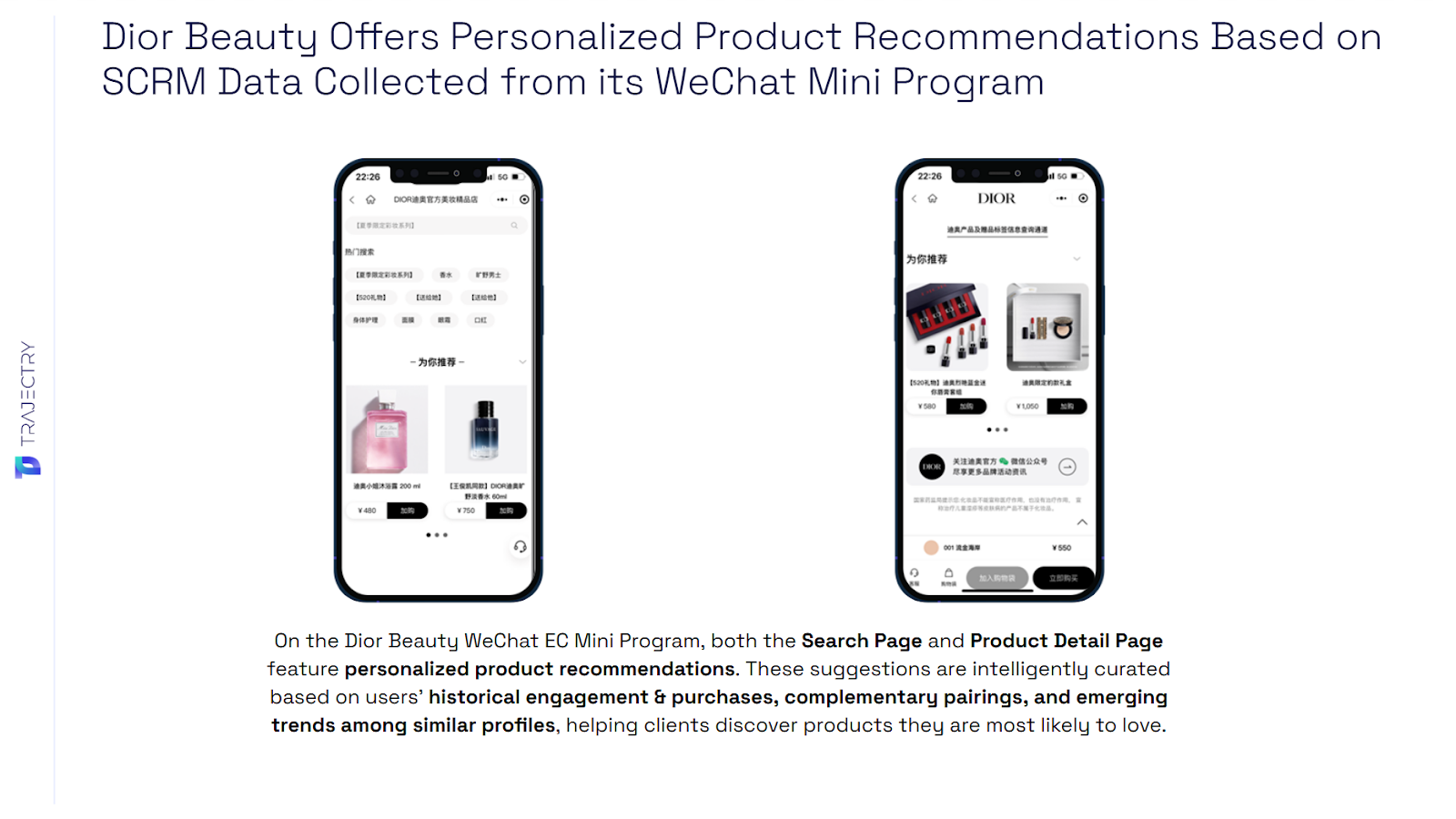
From these five lessons, one thing is clear: in China, WeChat is only the starting point of luxury’s digital transformation—but it will not end there. Already far more advanced than platforms like WhatsApp and others, WeChat sets the benchmark for the future of client engagement, showing where global trends are headed. For luxury brands, this is both a wake-up call and an opportunity: to prepare in advance and catch up to what Chinese consumers already expect.
At Trajectry, we bring deep expertise in co-strategizing digital strategies and maximizing WeChat’s capabilities. Backed by a strong network of 500 innovation partners—from tech giants to unicorns and leading startups—we are uniquely positioned to empower brands with the right innovative solutions: AI, IoT, AR, VR, XR, etc. Beyond building 360° WeChat solutions for e-commerce, SCRM and clienteling we also help brands replicate and scale these learnings across broader ecosystems, ensuring long-term growth and leadership in the age of AI.
Trajectry is an official Tencent WeChat certified partner, WeCom official partner, ISO certified and Reddot Design Award winner company. Over the last few years, the company has delivered over 100 WeChat Mini Programs for major brands in China.
Get in touch with us to explore how Trajectry can help your brand unlock this growth potential.